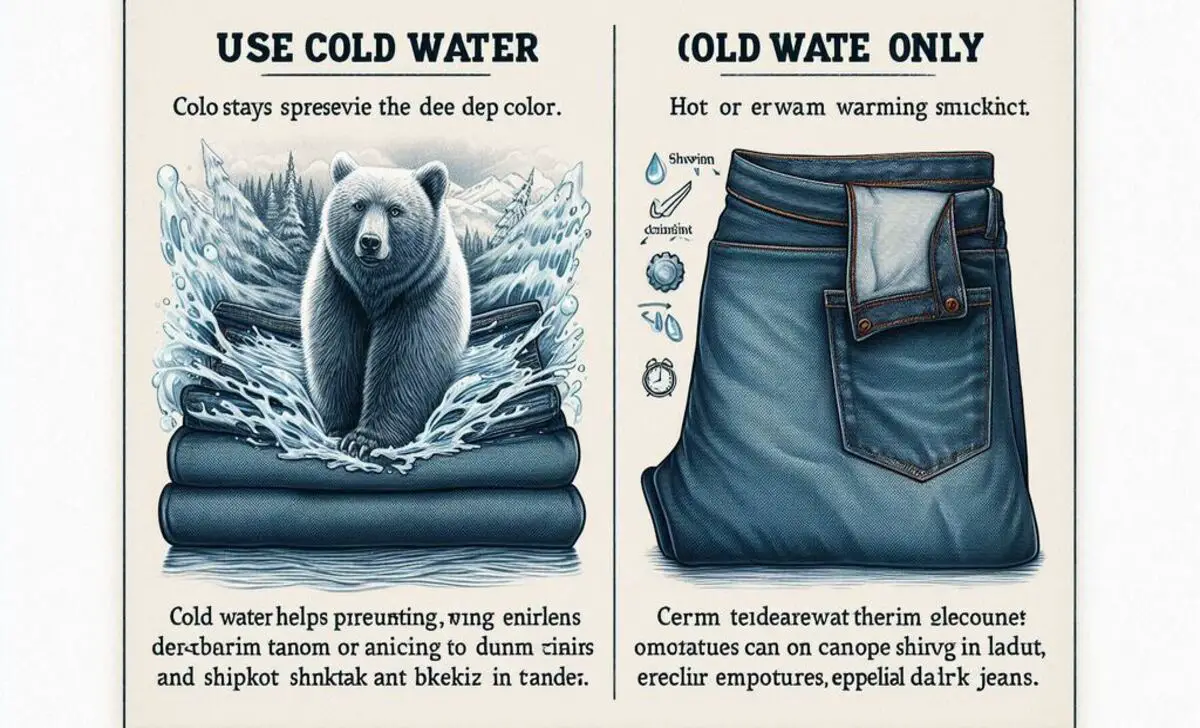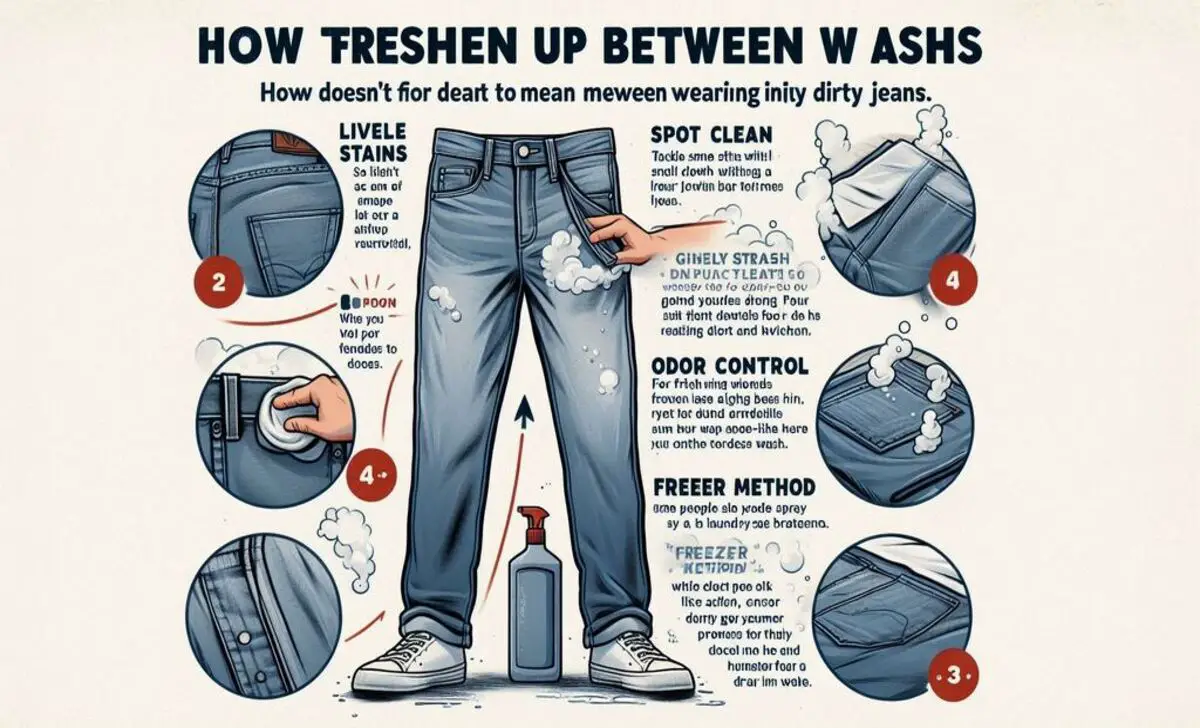Whether it’s a classic pair of blue jeans, a sharp set of black jeans, or a treasured denim jacket, knowing how often to wash denim is key to keeping it in top shape. Many of us wonder if we’re washing our jeans too much—or not enough.
The care of jeans depends on several factors, including fabric type, usage, stains, and personal preference. Different materials require different care. For instance, raw denim should be washed less frequently than stretch denim, which may need more regular cleaning. How often you wear your jeans also matters.
Casual outings or light activities allow for less frequent washing of jeans. However, strenuous activities or hot weather may require more frequent washes. If your jeans develop stains or odors, it’s time to wash them, regardless of how long it’s been since the last wash. Here’s everything you need to know about washing jeans, spot cleaning, and how to make your denim last.

General Guidelines
- Every 5 to 10 Wears: As a general rule, jeans should be washed after every 5 to 10 wears. This allows them to retain their color and shape while still looking clean.
- Spot Cleaning: For small stains or spills, consider spot cleaning instead of washing the entire pair. This can extend the time between washes.
- Cold Water: When it’s time to wash, always use cold water and a gentle detergent to help preserve the fabric and color.
- Air Dry: Avoid using a dryer, as high heat can shrink jeans and alter their shape. Instead, hang them to air dry
Why Frequent Washing Isn’t Always Best
Frequent washing can wear down denim, causing fading and weakening the fabric’s fibers. Each wash cycle in hot water can pull color from denim and reduce its lifespan. By washing jeans less frequently, especially if they’re not visibly dirty, you can help keep your beloved denim garments looking and fitting great.
True denim heads, also known as denim aficionados, advocate for washing jeans only every few weeks or even every few months to extend their durability. Spot cleaning minor stains and letting jeans air out between wears are popular ways to reduce washing.
Best Practices For Washing Jeans

Maintaining the quality of your jeans means washing them with care, as denim can be sensitive to frequent or rough washing. When it’s time to give your jeans a proper wash, here are the key steps to follow:
Turn Jeans Inside Out
This essential step protects the outer surface of the denim from the abrasive effects of the wash cycle, helping prevent excessive fading, fraying, and dye loss. By turning your jeans inside out, the interior takes the brunt of the wash while the surface remains more vibrant.
Use Cold Water Only

Cold water helps preserve the deep color and minimizes shrinkage or warping that can occur with higher temperatures. Hot or even warm water can cause denim fibers to contract, leading to a tighter fit and a more faded look, especially in darker jeans. Cold water also conserves energy and is less harsh on both the denim and the environment.
Select A Gentle Wash Cycle
Machine washing is convenient, but it can be rough on denim. The gentle or delicate cycle minimizes agitation, which reduces wear on the fabric and helps maintain the jeans’ fit and structure. If your washing machine offers a “denim” or “hand wash” setting, even better—these cycles are designed to protect durable fabrics like denim from excessive twisting and friction.
Choose A Mild Detergent

Harsh detergents can strip color and damage denim fibers, so it’s best to opt for a detergent specifically formulated for dark or delicate fabrics. These mild detergents are free from bleaching agents and harsh chemicals, helping to preserve the fabric’s integrity and reduce fading. Avoid fabric softeners, as they can break down the fibers in denim, leaving jeans less resilient and stretchy over time.
Avoid The Dryer—Opt For Air Drying
The heat from the dryer can shrink jeans and weaken the elasticity in denim with stretch, like those containing spandex. Instead, air dry by laying your jeans flat or hanging them up in a shaded, well-ventilated area. Hanging allows water to drain naturally, but take care to hang them by the waistband to avoid distorting the shape. Keeping jeans out of direct sunlight prevents color fading due to UV exposure.
Limit Wash Frequency

Washing jeans after every wear isn’t necessary unless they’re visibly dirty or have an odor. Spot cleaning for minor stains and airing jeans out after each use can help you extend the time between washes, which reduces overall wear and tear on the denim.
Should You Wash Raw Denim?
Raw denim is untreated and prized for its ability to form natural creases unique to your movements. Washing raw denim right away can prevent this custom look, so many laundry experts suggest holding off for six months to a year for raw denim jeans. When you do wash, use cold water and a gentle detergent, and avoid wringing out excess water to prevent distortion.
How To Freshen Up Between Washes

Not washing doesn’t have to mean wearing dirty jeans. Here’s how to keep your jeans fresh between washes:
- Spot Clean: Tackle small stains directly with a gentle detergent and a damp cloth.
- Odor Control: Air out your jeans between wears. For tough odors, some people use a light mist of laundry-safe spray.
- Freezer Method: While freezing won’t remove dirt, it can help reduce odor-causing bacteria.
Common Denim Washing Myths
Here are a few common misconceptions when it comes to caring for jeans:
- Freezing Kills All Bacteria: Freezing might kill some bacteria, but it doesn’t replace a good wash.
- Hot Water Is Better for Cleaning: Hot water can actually damage denim fabric, so stick to cold or warm water instead.
- The Dryer Is Fine for Denim: High heat can shrink and damage denim, so air drying is usually best.
Conclusion
Washing your jeans appropriately can significantly impact their lifespan and appearance. By considering fabric type, usage, and personal preference, you can establish a washing routine that keeps your jeans looking great while ensuring they remain comfortable. Remember to spot clean when possible and to follow proper care methods to prolong the life of your favorite denim.
Frequently Asked Questions
1.How Often Should I Wash My Denim Jeans?
Most people wash jeans every 5–6 wears or as needed based on activities. Dark jeans, in particular, benefit from less frequent washing to avoid fading.
2.Can I Machine Wash Raw Denim Jeans?
It’s best to wait for 6–12 months before washing raw denim, and then use cold water, a gentle detergent, and avoid the dryer.
3.Is Spot Cleaning Effective For Jeans?
Yes, spot cleaning minor stains can keep jeans looking fresh without needing a full wash.
4.What Temperature Should I Use For Washing Denim?
Cold water is best to preserve color and prevent shrinkage, although warm water can be used for more thorough cleaning.
5.Can I Use Fabric Softener On My Jeans?
It’s best to avoid fabric softener on denim as it can weaken the fibers over time.
6.Does Air Drying Affect The Fit Of Jeans?
Air drying helps retain the original shape and fit of jeans without exposing them to high heat.











